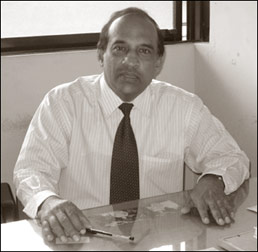Heart, mind and body
He saved the life blood of the nation:
By Rosanne Koelmeyer Anderson
[email protected]
|

Dr Gamini Goonetilleke
|
“Courage is the first of human qualities because it is the quality
which guarantees all others,” was his motto in life which took him to
the most susceptible line of duty as a leading surgeon who had spanned a
quarter of a decade.
A journey that goes far beyond the operating theatres of hospitals
around the country: the unrelenting dedication of an dynamic and
illustrious surgeon who worked untiringly on the blood-stricken fields
of war zone areas.
A surgeon’s heart is as important as his knife; it’s a calling from
above” says Dr Gamini Goonetilleke, the sportsman, the humanist, the
voice for rights and justice, the critic , the healer and surgeon who is
presently a Consultant attached to the Sri Jayawardenapura Hospital.
Dr Goonetilleke’s enthusiasm to embrace the profession was a
childhood dream and tribute to his alma mater, St. Joseph’s College,
Colombo. “Create a definite plan for carrying out your desire and begin
at once, whether you are ready or not, to put this plan into action.”
The smart and unassuming surgeon was a dynamic sportsman, cricketer
and ruggerite in his heyday until he reached his zenith in 1973 when the
sportsman turned academic who qualified as a doctor left for the UK to
further his studies as a surgeon. Patriotism brought him back to Sri
Lanka no sooner he saw his second dream come true and was appointed
President of the College of Surgeons, Sri Lanka in 2001.
The life and times of a surgeon in war and peace finally inspired Dr
Goonetilleke to author “In The Line Of Duty” which is an inspirational
read for every medical student, medical professional, students aspiring
to become doctors as well as those who believe in themselves and believe
that courage transcends all barriers which demonstrates a diligent
surgeon’s implicit understanding of human pain and suffering.
His tenures as a surgeon in Polonnaruwa and the combat zones of the
North-East in times of war in particular were “the best of times and the
worst of times”.
“Some of the most rare surgical problems were encountered in
Polonnaruwa and the more controversial ones were those in the
North-East. Reminiscing the past Dr Gonnetilleke said “I remember Nihal,
a twenty-six-year-old commando of the Police Special Task Force who had
been injured in a cross fire with the LTTE in the Eastern Province on
December 11, 1986 who was brought to my ward and immediate surgery had
to be done to save his arm. There were some complications thereafter and
I had to come back even on Christmas Day I remember.
But, to me it did not matter. I returned from Colombo and performed a
second operation.Today his arm is functioning well and it is 20 years
since, he is still attached to the Special Unit Task Force Commando in
the North-East.
“I volunteered my services at the time the Army needed it most. I
served at the Jaffna Base Hospital for quite some time. The injuries
were gruesome and needed active care. My job was to provide basic
life-saving care, stabilize them and then arrange to transfer them to a
hospital in Colombo for further care.
There were many times when I had travelled to Palai sitting on the
floor of the plane. Operation Eagle 1 and 2 in 1990 Operations
Balawegaya at Elephant Pass and many others were also challenges for me.
I had many causalities on my hands. It was agonizing and painful to see
the causalities in such excruciating pain but I just carried on. It was
sheer commitment for my fellow brotheren. War surgery is not easy at
all. It is a tremendous challenge for a surgeon.”
These are a few examples. But the bottom line is that one has to have
that unprecedented commitment to work in such circumstances. Among the
most horrendous injuries I have seen are those of the victims of mines.
“The pain and the sorrow was immense that it inspired me to conduct
research on soldiers wounded in landmines and even delivered an Oration
at the Sri Lanka Medical Association in 1994 on “Injuries due to anti
personnel mines in Sri Lanka. I have consistently called for a ban on
antipersonnel mines and even said that Sri Lanka must lead the campaign
for ‘anti personnel mines.”
“I also remember some of the reminiscences of those days when I
visited the Faculty of Medicine at Jaffna”, the sight seeing I did at
Jaffna and the visit to Jaffna, on A9, the plight of St James Church,
Gurunagar, Jaffna and the Jaffna Library after renovation and many more
incidences that will remain embedded in my mind for a lifetime.
As Dr. Gonetilleke’s quest and yearning to pursue his heart’s call he
says “Let there be more courageous men and women to continue to render
their dedicated services in the field of surgery in such circumstances.
Bravery is for those who aspire it . A stitch in time saves nine. |
